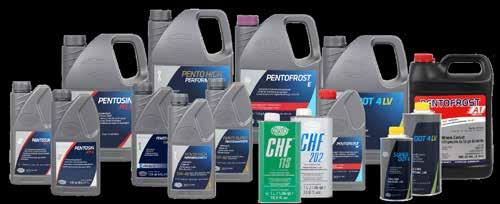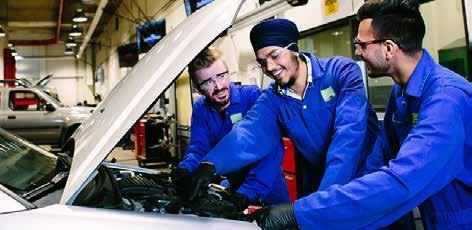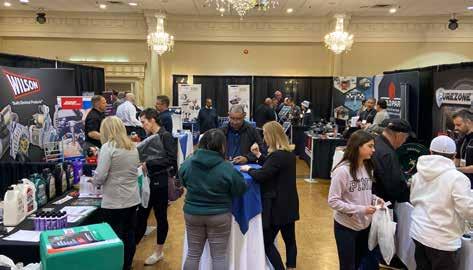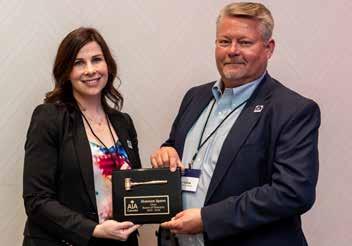
6 minute read
EyeSpy
Have an interesting picture to share? Send a high-resolution image to adam@turnkey.media Check

Work Backed
Students enrolling in VCC’s program will see strict industry standards but then earn a nationally and internationally recognized trade certificate.
“This is great news for automotive-minded young people and their parents,” said Michael Coley, president of the ASE Education Foundation. “Because this program increases cooperation between local education and industry leaders, it gives added assurance that VCC’s graduates will be employable entry-level technicians.”
Aftermarket Employment Rebounds
FAST & RELIABLE SERVICE

PREFERRED PRICING
TECHNICAL TIPS FROM INDUSTRY LEADING EXPERTS
THE AUTOMOTIVE AFTERMARKET led the entire automotive industry in positive employment change last year compared to the year before, according to DesRosiers Automotive Consultants.
Employment levels in the automotive industry as a whole are up, narrowing a gap that emerged at the start of the COVID-19 pandemic in 2023. Still, the industry is about 21,000 jobs below pre-pandemic levels.
But breaking it down by segment, the aftermarket has essentially recovered, DesRosiers noted. Automotive parts and accessories stores were up 5.4 per cent at the end of 2022 compared with December 2021.
Just behind was the automotive repair and maintenance segment, which saw a 4.6 per cent increase for the same period.
“The overall picture for employment in the auto industry was positive for 2022 despite some setbacks in certain segments,” said Andrew King, managing partner at DesRosiers. “Whether this employment recovery continues unabated throughout the broader economic uncertainty of 2023 remains to be seen.”
Other segments that saw an increase included dealers (2.3 per cent) and parts and accessories manufacturing (1.2 per cent) and motor vehicle manufacturing (0.3 per cent).
As King mentioned, some areas saw a drop. Parts and accessories wholesale (2.8 per cent) and metalworking machinery manufacturing jobs (1.3 per cent) fell in 2022 fell from 2021.
Millennials More Likely For Minor Diy
NEW RESEARCH HAS found that the younger generations are more likely than the older ones to take on minor car repairs.

The study from eBay found that more than a quarter of Millennials would undertake their own vehicle repairs. They’d rather save on costs than visit their local automotive repair and service shop.
Furthermore, Gen Z is also seemingly willing to get its hands dirty. Nearly a quarter (23 per cent) of those aged 17-24 responded that they would be inclined to undertake minor car repairs themselves.
Meanwhile, fewer than one-in-five (18 per cent) of Baby Boomers are willing to get their hands dirty – they’re more likely to opt for help from their local shop.
Looking at some of the more common tasks consumers take on themselves, more than half of consumers are prepared to replace windshield wipers at home, according to eBay. Broken or smashed door mirrors were among other easy-to-fit items popular with vehicle owners last year, eBay reported. A fifth of respondents said they would be willing to carry out a mirror replacement.
Quebec Has Most Eager Ev Buyers
DESPITE CONCERNS, the interest level Canadians have to own an electric vehicle as their next car remains high, a new survey found. And interest is highest in Quebec.
The second annual Car Ownership Index from Turo, a peer-to-peer car-sharing marketplace, reported that about a quarter (26 per cent) of those interested in buying or leasing an EV are motivated by the idea of choosing a better car for the planet.

More, however, are looking at electrics as a way to save money spent at the fuel pump (38 per cent).
Still, costs to purchase are getting in the way. The survey found the biggest hesitation around purchasing or leasing an EV (31 per cent) is based on cost.
But that hasn’t slowed down interest in finding an alternative to an internal combustion engine. Turo’s survey reported that more than half of Canadians (54 per cent) plan to buy a hybrid or electric vehicle. That’s similar to what the survey found one year ago.
And it’s Quebecers who are the most eager to adopt EVs — 64 per cent said electric is their next choice.
What would help EV interest, the survey found, is growing familiarity around these vehicles with the buying public. If they had the opportunity to test drive an EV for a few days or weeks before making a decision to purchase, 54 per cent of Canadians said they’d be more comfortable buying one.
AIA CANADA’S NEWEST BOARD MEMBERS
SHANNON SPANO IS now the chair of AIA Canada.
With the vice president of Sales at Wakefield Canada, sliding into the role, Jason Yurchak, senior vice president at Worldpac Canada, was elected to the role of immediate past chair during AIA Canada’s Annual General Meeting on May 3.
Joining them on the board are Ryan Bruno, president of CSN Collision Centres, as first vice chair and Tony Kuczynski, president and CEO of Mister Transmission as second vice chair.
Four new members of the board were elected to the board. Jasna Smiljcic, senior director and country leader at Gates, Jason G. Herle, CEO of Fountain Tire, Michael O’Callaghan, COO and vice president of operations at Craftsman Collision and Micheline Davies, senior vice president of automotive at Canadian Tire are the newly elected members and will serve on the board until the 2026 AGM.
AIA Canada thanked former directors Bob Jaworski and Graham Jeffery for their commitment and service to the board.

SHAREHOLDERS GIVE THUMBS UP TO UNI-SELECT DEAL
UNI-SELECT RECENTLY announced that its shareholders gave the thumbs up to the sale of the company to LKQ Corporation.
A special meeting of shareholders saw the resolution approved by nearly 99 per cent of votes cast by shareholders present virtually or represented by proxy and entitled to vote at the meeting.
The deal also received anti-trust clearance from both Canadian and American regulators.
The deal was announced at the end of February. Chicago-based LKQ will buy all of Boucherville, Quebec-based Uni-Select’s issued and outstanding shares for $48 per share in cash, valuing the transaction at about CAN$2.8 billion.
The agreement also includes Uni-Select’s U.K. auto parts distribution business GSF Car Parts with more than 175 companyoperated stores. LKQ has noted it will look to part with the business following its acquisition.
Over 500,000 vehicle parts and products in inventory, all ready for delivery: that’s over 500,000 good reasons to make us your number one partner. napacanada.com
The arrangement is expected to close in the second half of this year.
OUT OF STOCKS LESS PROBLEMATIC, DATA SHOW
A SWEEP OF GLOBAL data shows there has been a significant reduction in the number of out-of-stock vehicles and automotive products compared to a year ago.
DataFeedWatch reported that its Feed Marketing Report 2022 found 57.46 per cent of products were out of stock in the global automotive eCommerce market just 10 months ago. As of late February, that number sat at 26.46 per cent.
DataFeedWatch compiled the info from 17,000 online stores across 60 countries.
The group noted that even though the segment’s out-of-stock numbers are high — only sporting goods are suffering more — “its bad days of fewer products available … are well over,” it said.
Vehicle parts have the largest median of products at more than 7,900, more than health and beauty and home supplies.
DIFM SURGES IN THE U.S.
DO-IT-FOR-ME services in the U.S. saw a big-time rebound after being hit hard during the pandemic — and at levels never seen before, according to new research.
Lang Marketing reported that the parts and labour volume of the DIFM light vehicle market jumped by US$30 billion in 2021 and 2022. That marks the biggest surge ever recorded by this market in the U.S.
“It reflects the strength of the DIFM market and the pent-up demand for aftermarket parts and labour following the onslaught of COVID-19, which blasted a double-digit decline across the 2020 DIFM market,” the group noted in a recent Aftermarket iReport.
But the good news wasn’t spread evenly throughout the aftermarket. There were winners and losers, Lang pointed out. Four outlet groups made up more than 85 per cent of the volume surge: repair specialists, vehicle dealers, service stations and garages and foreign specialists.
The biggest chunk (29 per cent) was taken by repair specialists, those focused on a limited array of vehicle repairs. “Most of this gain was the result of repair specialists expanding their repair scope, coupled with their growing foreign nameplate repair,” Lang reported.
Dealers were just behind, raking in a quarter of the pot. Specifically, however, foreign nameplate dealers were the ones that generated most of the repair growth in this group.
Service stations and garages, despite diminishing population, took in 17 per cent of the growth and foreign repair specialists got 16 per cent of the increase.
IN MEMORIAM: JOHN GRANT, 104
A LONG-TIME FIGURE of the automotive aftermarket has passed. John Grant, the co-founder of Grant Brothers Sales, died this past weekend.
His obituary said he passed peacefully at home at the age of 104. He was born in North Sydney in 1918 and raised throughout Nova Scotia.
He entered the Second World War and the Royal Canadian Navy 24 years old. It was a chance meeting with his brother, Frank, who was then a decorated pilot. They first discussed plans to start a business together.
After the war, Grant Brothers Sales Limited was launched. They represented manufacturers of auto parts across Canada. He worked there until 83 years old before passing the company on to family.
In a LinkedIn post, his grandson Charlie Grant, now president and CEO of the company said, “We are, and always will, continue to carry the torch forward, Grandpa. We will continue to act with class and respect our people, our industry and our customers, just as you did 77 years ago when you started this business.”








